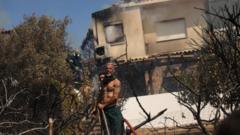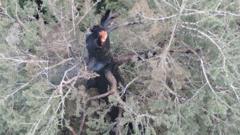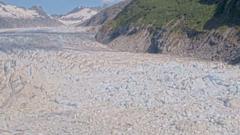A severe wildfire has ravaged coastal towns near Athens, Greece, specifically Palaia Fokaia and Thymari, leading to significant destruction of homes and mandating the evacuation of residents. The blaze, which ignited in low vegetation, rapidly transitioned into populated areas as Greece endured its first intense heatwave of the summer, with temperatures soaring to 40°C (104°F).
Local officials report that at least 20 homes were completely destroyed, with many others sustaining severe structural damage. Efforts to extinguish the flames are hampered by strong winds that fuel the fire's rapid expansion. Residents, alongside firefighters, forest rangers, and air assistance, have banded together to combat the wildfire and protect their properties, while the coast guard has also been tasked with monitoring the coastline.
Emergency alerts were disseminated through the 112 system, prompting residents in multiple towns and villages to evacuate as the fire closed in. In response to the increasing frequency of wildfires due to climate change and prolonged hot summers, Greece has fortified its firefighting capacity with an additional 18,000 firefighters and volunteers this season.
Earlier incidents this week saw extensive damage on Chios Island, with reports of a Georgian woman arrested for allegedly starting a fire inadvertently. Witnesses described harrowing scenes, with one local sharing that her home was lost before she could get back, while others were more fortunate as their homes survived the flames.
As the fire moved further east toward the ridge of a nearby hill, authorities confirmed that over 1,000 individuals were evacuated. Rescuers saved 11 tourists trapped by the flames at a beach, demonstrating the emergency teams’ swift response. Despite urgent evacuation orders, some residents chose to remain, attempting to douse flames with garden hoses, which authorities warned could hinder professional firefighting efforts.
The situation remains perilous, with over 40 individuals, including vulnerable children and elderly residents, needing rescue from police. Greece's fire service spokesperson detailed the ongoing struggle against the blaze, particularly in areas perilously close to residential neighborhoods.
Local officials characterized the conditions as extremely challenging and opened municipal facilities to provide shelter and medical support to those in need. A special arson investigation unit has been dispatched to determine if the wildfire was intentionally ignited. As forecasts predict continued high temperatures and elevated wildfire risks across Attica, Evia, Peloponnese, and the northern Aegean, the threat of further devastation looms large.




















